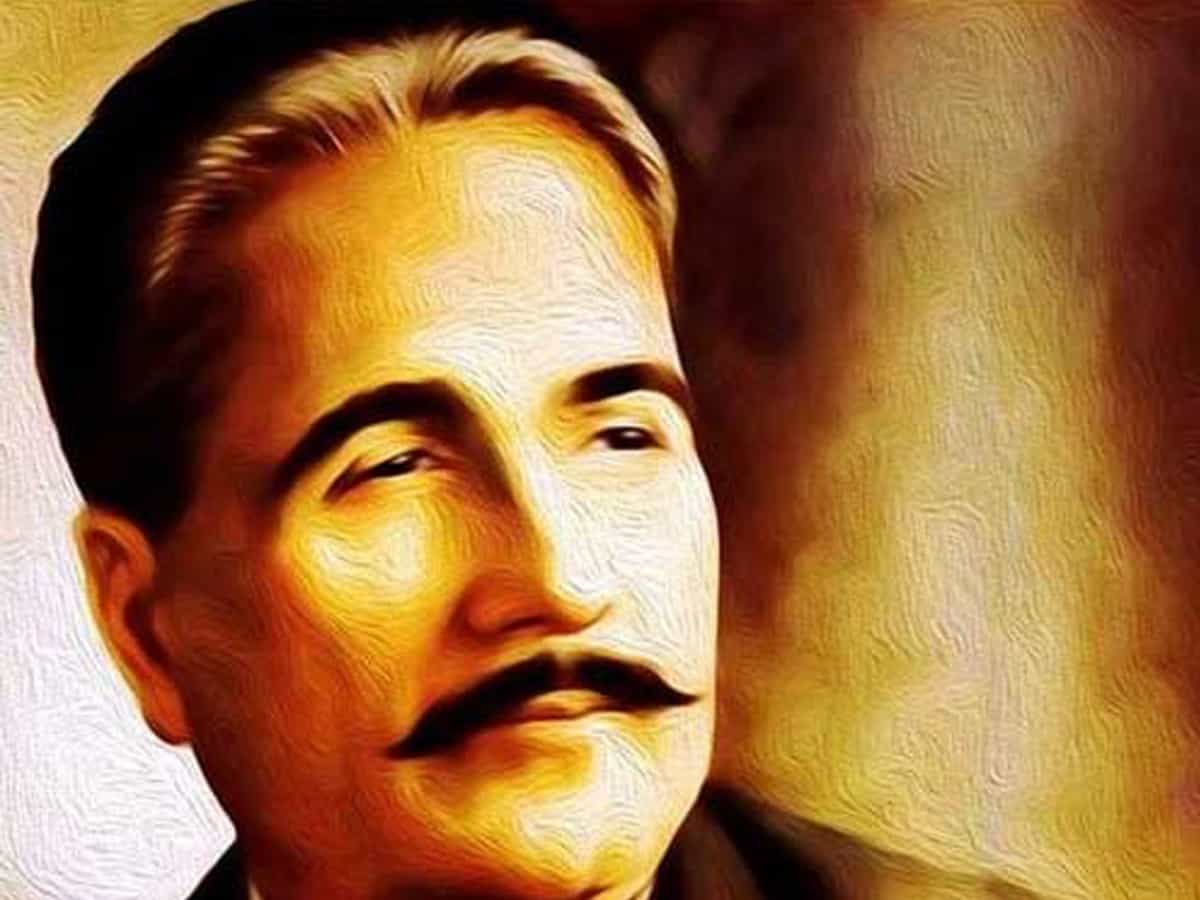Hyderabad: The often misunderstood shayar-e-Mashriq (poet of the east) receives heat from all sides of the Islamaphobic political spectrum every year on his birthday. However, one must not let his poetry and philosophy die down in the pages of history and let Pakistan have a 100% claim over the gem that initially gave India “saare jahan se achcha Hindustan hamara.”
Even though Iqbal, in his poem Wataniya, changed his stance on nationalism and called it the “biggest man-made idol of the new century that must be destroyed,” he advocated for nations to be based on principles instead of race, geography, ethnicity, community and language. Oppressed Muslims all around the world have taken inspiration from his poetry, which if not understood deeply, can give various colourful interpretations to a critic.
Initially, a staunch nationalist, Iqbal after his higher education in the West returned in 1908 as a completely new personality, which was now portrayed him as a leader of the Islamic Revivalist Movement (the pan-Islamic movement to reconstruct society under divine guidance).
His Shikwa (complaint against God) had earned him serious fatwas (religious ruling from traditional Muslim scholars) of being a kafir (unbeliever), however, his subsequent jawab-e-shikwa (answer to the complaint) wreaked havoc across the Muslim world and was successful in capturing the imagination of millions of Muslims all around the world at the time when they were politically, socially and economically subjugated after centuries of colonization, wars and corruption.
Indian Muslims, especially post 2014, find themselves in a similar situation of socio-economic and political subjugation and that is where we find hope in his philosophy, argues a researcher from Jamia Millia Islamia University (Delhi) who didn’t want to be named.
Iqbal’s philosophy reminds the Muslim community of their divinely ordained responsibility to uphold justice, free humanity from the shackles of all forms of slavery and crush tyrants said the researcher. “This is what psychologically colonized Muslims need to be reminded of today to rise up again and free humanity,” he added.
Stating where exactly he thinks Indian Muslims can derive hope from Iqbal’s poetry, he quoted a few lines from Jawab-e-Shikwa as an example:
“Safa e dehr e batil ko mitaya kis ney? Nauh e insaani ko ghulami se chudaya kis ney? Mere Kaabe ko jabeeno se basaya kisney? Mere Quran ko seeno se lagaya kis ney?
They toh aaba wo tumhare hee, magar tum kya ho? haath par haath dhare muntazir e farda ho, wo zamane mei muazaz hue Musalmaan hokar, aur tum khwaar hue tarik-Quran hokar”
[Translation: Who erased evil from the earth? Who released humanity from the shackles of slavery? Who filled the Kaaba with worshippers, who held the teaching of the Qurna close to their hearts? Those were your own ancestors but what are you? You sitting hand in hand waiting for a hero, they were leaders of the era when they were true Muslims, and you are humiliated today when you are far away from the teaching of the Quran. (Jawab e Shikwa)]
Ziauddin Nayyar, the president of the Iqbal Academy Hyderabad and Majlis Tameer e Millat said that young Indian Muslims can benefit a lot from Iqbal, for both personal development and to serve humanity.
Iqbal’s philosophy of Khudi (self) is something that youngsters can greatly benefit from and learn to become the best version of themselves said, Ziauddin Nayyar. He quoted Iqbal’s famous line:
“Khudi ko kar buland itna ki Khuda bande se khud pooche, bata teri raza kya hai?” (Make yourself so great that God himself will ask you, what is it that you want)
Was Iqbal religious supremacist and anti-modern?
When asked why Iqbal is often portrayed as anti-modern, the Jamia scholar refuted the statements and instead argued that Iqbal, in fact, advocated for modernization without westernization. The scholar further asked Iqbal’s critics to read “Reconstruction of Religious Thought in Islam” which is a set of lectures by the poet.
“And when Iqbal or any other revivalists talk about the west, they don’t mean the countries that are geographically located on the west side of the globe, they don’t have anything against their people, by west Iqbal means an ideology, an ideology that is a toxic mix of materialism, Godlessness and nationalism, a combination which has led to world wars and genocides responsible for millions of deaths,” the scholar said.
Ziauddin Nayyar, reacting to the allegations of Iqbal being painted as an anti-national and religious supremacist, rejected the claims and said that Iqbal was a humanist who advocated for the service of entire humanity.
Muzakkir, a PhD scholar at the International Islamic University of Malaysia, similarly, denied claims of Iqbal being a religious supremacist, anti-democracy and anti-secularism. The scholar said that Iqbal gave solutions to modern human problems from the teachings of Islam. “If Karl Marx gives solutions to modern problems from communism, does that mean he was a supporter of communist dictatorship?” he questioned.
Moreover, the scholar said that Iqbal criticised the form of democracy at that point in time. “Iqbal is not just for Muslims, Iqbal is for everyone,” he added.

